10 Top Benefits Of Almond Butter, Nutrition, And Recipes
Learn why you should switch to this nutrient-dense nut butter and how it benefits your health.
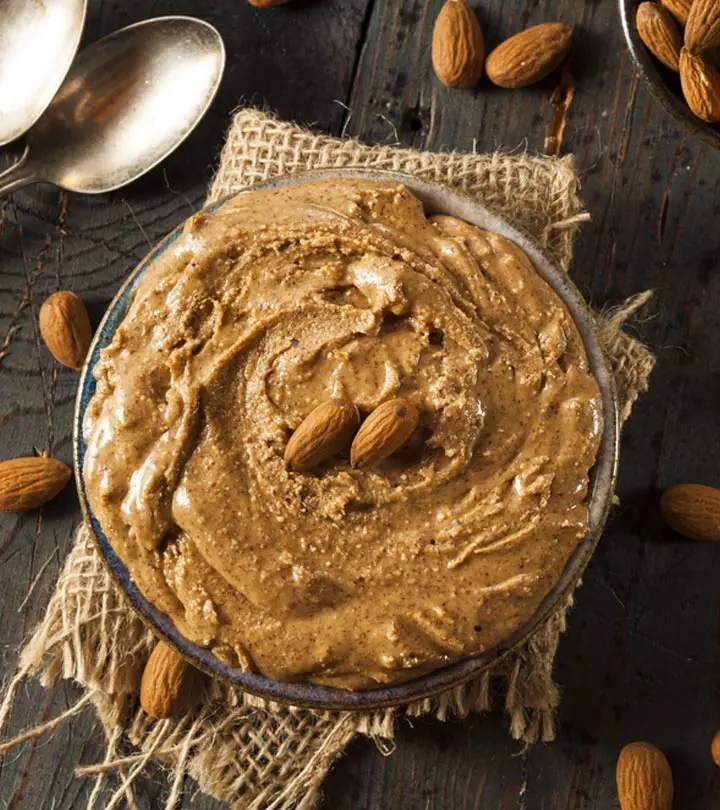
Image: Shutterstock
Is almond butter healthy? Yes, almonds have long been associated with improving memory and metabolism. In addition, they are rich in protein and fiber that are necessary for proper gut functioning. As a result, almond butter has recently become more popular as a replacement for milk butter, and for good reason. It is rich in vitamin A and calcium that make it more beneficial than most other butter options.

This article discusses almond butter benefits, how you can prepare at home, and the various recipes you can try using it. Keep reading to know more.
 Know Your Ingredient: Almond Butter
Know Your Ingredient: Almond ButterWhat Is It?
A dense paste made by grinding almonds into nut butter.
What Are Its Benefits?
Aids in weight loss, improves digestion, enhances brain function, and much more.
Who Can Consume It?
It is safe to consume in moderation for all adults except people with kidney stones or those who are allergic to it.
In This Article
Almond Butter: What Is It And How Nutritious Is It?
Almond butter is made from raw almonds and is a good replacement for milk butter if you want to opt for plant-based foods
. It is rich in nutrients and supplies a lot of carbohydrates per serving. In addition, almond butter has monounsaturated fatty acidsi Simple fat molecules that contain one unsaturated carbon bond and are effective in lowering the risk of stroke and heart conditions. .
Dr. Daniel Boyer, from Farr Institute, says, “Monounsaturated fats help to lower LDL (’bad cholesterol’) and raise HDL (’good’) cholesterol.”
A serving of almond butter (about 16 grams on a bread slice/roll) contains the following nutrients (1):
| Nutrient | Amount |
| Energy | 92.8 kcal |
| Protein | 3.35 g |
| Carbohydrates | 3.01 g |
| Total Fibers | 1.65 g |
| Total Fats | 8.88 g |
| Sugar | 1 g |
| Calcium | 55.5 mg |
| Magnesium | 44.6 mg |
| Iron | 0.558 mg |
| Phosphorus | 81.3 mg |
| Potassium | 120 mg |
| Sodium | 36.3 mg |
| Zinc | 0.526 mg |
| Copper | 0.149 mg |
“A typical 2 tablespoon serving provides a whopping 22% of the daily value for magnesium and 10% of the daily value for calcium,” says Megan Wong, an RD at AlgaeCal.
Almond butter is also rich in minerals, vitamins B3, B6, B9, E, and some forms of vitamin A. It is also a rich source of omega-3 fatty acids, which are excellent antioxidants. These vitamins aren’t normally found in the body and need to be supplemented through food sources. Almond butter is an excellent one.
 Did You Know?
Did You Know?Read on to find out how your body can benefit from almond butter.
Key Takeaways
- Almond butter may help reduce the risk of cardiovascular disease by managing cholesterol levels.
- It may aid in enhancing brain function as it is a storehouse of powerful nutrients.
- Almond butter may help you feel full, aiding in weight loss as it contains fiber and carbohydrates.
- You can use almond butter for making cookies or add it as a dressing to a salad.
Top Benefits Of Almond Butter
We have seen the nutritional profile of almond butter. Each of these nutrients contributes to maintaining the body’s metabolism. The benefits of almonds are well-known, and almond butter is a convenient way to incorporate these nutritious properties into your daily routine. Here are the top 5 ways almond butter can be beneficial.
1. May Help Reduce Cardiovascular Disease Risk

It is scientifically proven that consuming almonds or almond butter daily reduces bad cholesterol (LDL) and increases good cholesterol (HDL) (2). The monounsaturated fatty acidsi Simple fat molecules that contain one unsaturated carbon bond and are effective in lowering the risk of stroke and heart conditions. in almonds promote the production of HDL.
In addition, the vitamin E in almonds prevents clogging of the blood vessels. It acts as a vasodilator. Vasodilation and the increase in antioxidant levels in the body help reduce high blood pressure. These factors further promote heart health (3). However, more research is warranted to further understand the link between vitamin E and cardiovascular health.
2. May Help With Weight Loss
The carbohydrates and fiber in almond butter help you feel satiated. Almond butter, in this manner, helps curtail the need your body feels to eat energy-rich foods (4). Hence, it may help reduce your intake of extra fatty food to a certain extent. This leads to weight loss and, subsequently, controlled weight gain if you want to shed a few pounds. However further research on human subjects is required to validate this claim.
3. Is Rich In Omega-3 Fatty Acids
Omega-3 fatty acids are major antioxidants with various functions (5). They help reduce the risk of cardiovascular disease due to their antioxidant properties. Eicosapentaenoic acid (EPA) and Docosahexaenoic acid (DHA) are two important omega-3 fatty acids that reduce the body’s triglyceride levels (which directly influences heart health).
Omega-3s also improve vision and reduce the risk of age-related macular degenerationi A common eye disorder in old age that causes loss of vision due to damage to the central part of the retina (macula). (AMD). They also reduce pain caused by rheumatoid arthritisi An autoimmune disease in which the immune system attacks its own tissue especially those in the joints, causing chronic inflammation. .
4. May Help With Better Brain Function

Almonds are a great source of vitamin E, phenolic acids, and folate, which are all essential for the proper functioning of the brain. One study on rats showed that repeated administration of almonds for 28 days showed immense improvement in their cognitive behavior (6).
Almonds could also help prevent age-related brain function deterioration. In another human study conducted on 50- to 70-year-olds, consumption of 3oz of almonds every day for six months showed improvement in their overall brain function (7).
5. May Help With Healthy Pregnancy
says, “Calcium can prevent preterm labor and delivery, lower the risk of preeclampsiai A rare condition that causes high blood pressure during pregnancy and is considered a severe complication. Also known as toxemia. , and may increase birth weight.”
Almond butter has folate, calcium, and iron, which are necessary for the mother’s strength and fetal growth (8). But the amount consumed needs to be taken care of as per your healthcare provider.
6. May Help With Digestive Health
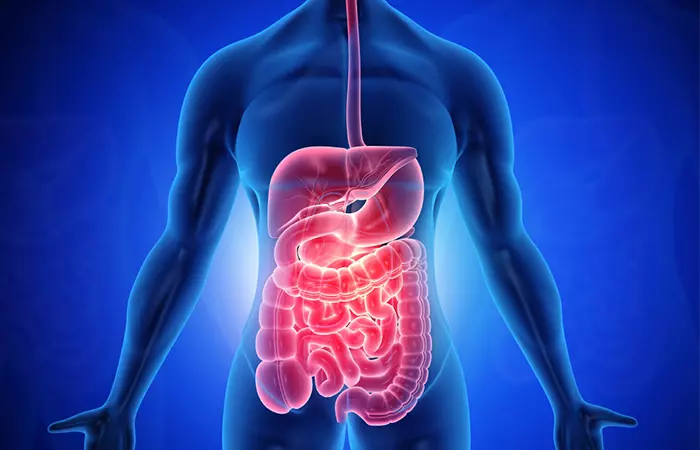
The fiber in almond butter is good for the gut. This fiber is non-soluble and acts as a lining in the digestive tract. It smoothens the digestion process and could also help with smooth excretion. It even promotes good gut flora, which is essential in maintaining the pH of the digestive system (9).
7. May Help Promote Bone Health
Almond butter has magnesium and calcium, which are essential for bone health (10).
Melissa Mitri, an RD with Wellness Verge, says, “Almond butter contains calcium for healthy bones, as well as magnesium to aid in calcium absorption.”
8. May Reduce Diabetes Risk
The magnesium in almond butter reduces insulin resistance in the body. Lower insulin resistance means better uptake of glucose in the body (11). This way, it may help to reduce the risk of diabetes.
9. May Help Reduce Skin Inflammation
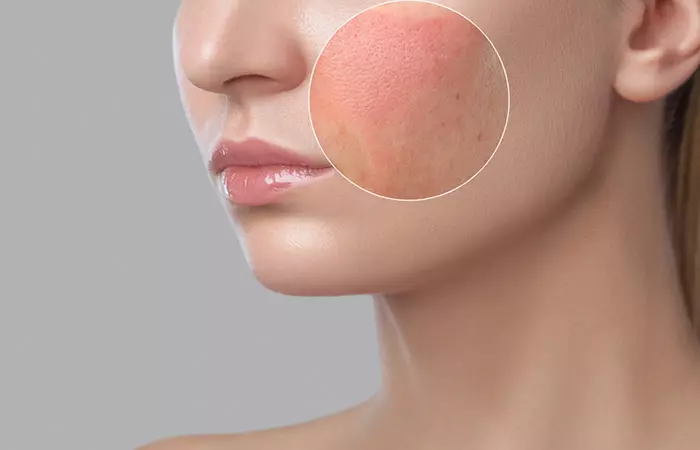
Almond butter has, to some extent, omega-6 fatty acids too. Along with the omega-3s, these help in the production of eicosanoids that are essential anti-inflammatory compounds. They have proven to help manage skin diseases like psoriasisi A chronic autoimmune disease that causes itchy, scaly rashes and patches on the scalp, knees, and elbows. , atopic dermatitisi A condition that affects the skin, causing rashes that are severely itchy, inflamed, and dry. Also known as eczema. , and eczema (12).
10. May Reduce Cancer Risk
A few scientific studies suggest that almonds may play a pivotal role in preventing certain types of cancer, including breast cancer and colorectal cancer. One study examined the impact of nut consumption on breast cancer development and revealed that high consumption of almonds reduced the risk of breast cancer (13). Similarly, a separate study that focused on colorectal cancer found a strong association between high nut consumption and a reduced risk of the disease. Women and men who consumed three or more servings of nuts per week showed a significantly lower risk of colorectal cancer (14). Although there is a lack of research specifically on almond butter, the studies support the idea that it might be beneficial since it is extracted from almonds.
These are the various ways in which almond butter benefits your health. Guess what – you can make it right at your home. Read on for the recipe.
How To Make Your Own Almond Butter
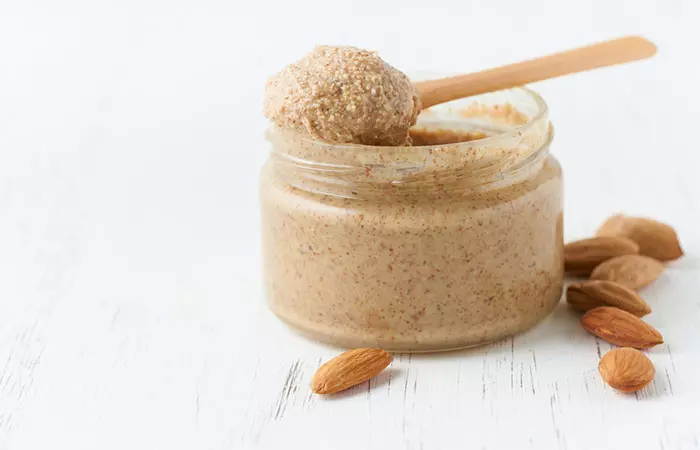
Making organic almond butter at home is the better option because it preserves the nutritional properties of almonds.
Quick And Easy Almond Butter Recipe (makes 500 g)
What You Will Need
- 500 g or 3 cups of raw almonds
- ¼ teaspoon of salt
Optional
:
- ¼ teaspoon of cinnamon powder
- ½ teaspoon of vanilla extract
- 2 tablespoons of maple syrup
Method
- Preheat the oven to 350 °F.
- Spread the almonds out on parchment paper and toast in the oven for 10 minutes. Stir around halfway through to ensure equal toasting.
- Cool the almonds until they are slightly warm.
- Add the almonds to a high-speed blender or a food processor. Blend until smooth. It might take a while, but the almonds will go from a lumpy texture to a creamy one. Midway through, if the mixture heats up, turn it off and let it cool.
- Once you get a creamy texture, add in the salt and any other seasoning you wish to. Blend it well.
- If you add maple syrup, let the mixture cool, and blend it again to get back the creamy texture.
- Let the almond butter cool and transfer it to an airtight glass container.
 Quick Tip
Quick TipRecipes To Try Using Almond Butter
1 to 2 tablespoons (approx. 32 g) of almond butter every day can help boost your energy while not overpowering your diet.
Here are some serving suggestions:
- Spread it on toast or crackers for a quick and tasty snack.
- Stir it into oatmeal or yogurt for a creamy, nutty twist.
- You can use it as a dip for apple slices, bananas, or celery sticks.
- Add a spoonful to smoothies for extra richness and protein.
- You may make a simple sandwich by pairing almond butter with jam or honey.
You can also use it in many delicious recipes.
1. Almond Butter Cookies With A Tinge Of Coffee
What you will need
- ¾ cup of almond butter
- ¾ cup of oats flour
- ¼ teaspoon of salt
- ¾ teaspoon of baking soda
- ¼ cup of brown sugar
- 1 tablespoon of water or any plant-based milk
- 2 teaspoons of instant coffee powder
Method
- In a bowl, whisk the almond butter until soft.
- Add in the powdered oats, salt, and baking soda. Dissolve the coffee powder with the water/milk. Add to the mixture.
- Mix and knead the ingredients till you get a rough dough. The oils from the almond butter will help smoothen the dough a bit.
- Form small balls, flatten them, and place them on parchment paper such that they are a little far away from each other.
- Preheat the oven to 350° F. Place the tray closer to the grill — bake for 10 minutes.
- Let them rest for about 10 minutes.
- Serve!
 Quick Tip
Quick Tip2. Crunchy Romaine Salad With A Lime Almond Dressing
What you will needFor the salad
- 2 carrots, thinly sliced
- 1 large cucumber or zucchini, thinly sliced
- Red and yellow bell peppers (1 each), thinly sliced
- Romaine lettuce, torn into bite-sized pieces
- 1 onion, thinly sliced
- 3 jalapeño peppers, thinly sliced
For the dressing
- 4 tablespoons of almond butter
- 1½ tablespoons of raw honey
- 1 teaspoon of soy sauce/tamari
- Juice from one medium lime
- 4 tablespoons of water
- A pinch of red chili flakes
Method
- Prepare the dressing first by mixing all the ingredients. Adjust the taste to your liking. Let it rest for a bit so that the flavors can mix.
- For each serving, assemble the romaine lettuce at the bottom and then with the salad. Pour ¼ of the dressing on top.
- Serve and enjoy!
Calgary Avasino, a food vlogger, explains 3 easy ways to serve almond butter. The quickest one is almond butter spread on coconut oil toasted bread and tortilla. She says, “My kids really love it! Sometimes I bring this when I pick them up from school, and they just munch that down on the way home. So it’s got a lot of good protein, very good fats, and vitamins and minerals that are wonderful for them (i).” She also spreads the almond butter on celery stalks and tops it with raisins. The most frequent method is serving it as a spread on apple.
Risks And Precautions
Before consuming almond butter or adding it to your daily diet, you must consult a doctor if:
- You are allergic to nuts. You don’t need to be allergic to almonds if you are allergic to other nuts. But, it is better to be safe.
- You have a history of kidney stones. Oxalates in almonds tend to flare up kidney stones (15).
- Almond butter is high in calories (1). So, eating too much can lead to weight issues. To avoid this, stick to 1-2 tablespoons per day.
Infographic: 6 Important Health Benefits Of Almond Butter
Almond butter is packed with health benefits, from promoting heart health and weight management to providing essential nutrients. However, there are truly 6 important benefits to adding this energizing treat to your diet. Check out the infographic below to read them!
Some thing wrong with infographic shortcode. please verify shortcode syntax
Conclusion
Almond butter is one of the tastier kinds of butter and is loaded with nutrients. It has a high energy profile and a high fiber content, which gives your body enough energy to feel satiated for a while. Reduced intake of food means better control over your body weight.
Almond butter may help reduce the risk of cardiovascular disease and AMD, maintain a healthy pregnancy, promote better skin health, and improve the digestive system. It could also help in maintaining blood sugar levels.
Almond butter can be used in various recipes to add a sweet taste and a buttery texture. It is, overall, a winning treat! Start including it in your diet today.
Frequently Asked Questions
Is almond butter healthier than peanut butter?
Yes. When comparing almond butter vs. peanut butter, both are nutritious, but almond butter is healthier than peanut butter due to the presence of more nutrients (1), (16). Also, almond butter contains less saturated fat (unhealthy fat) than peanut butter.
Can bacteria grow in almond butter?
No. As per studies, pathogenic food-borne microorganisms (bacteria) cannot grow in nut butters like almond butter (17).
Is almond butter good for bodybuilding?
Yes, it is an excellent source of protein, healthy fats, and fiber, which makes it a beneficial addition to a bodybuilding diet. However, it’s important to consume it in moderation as it’s also high in calories.
Is almond butter good for you after a workout?
Yes, it can be a great post-workout snack. Anecdotal evidence suggests that its high protein and carbohydrate content can quickly restore energy levels and promote optimal muscle repair and recovery.
Illustration: Top Benefits Of Almond Butter, Nutrition, And Recipes
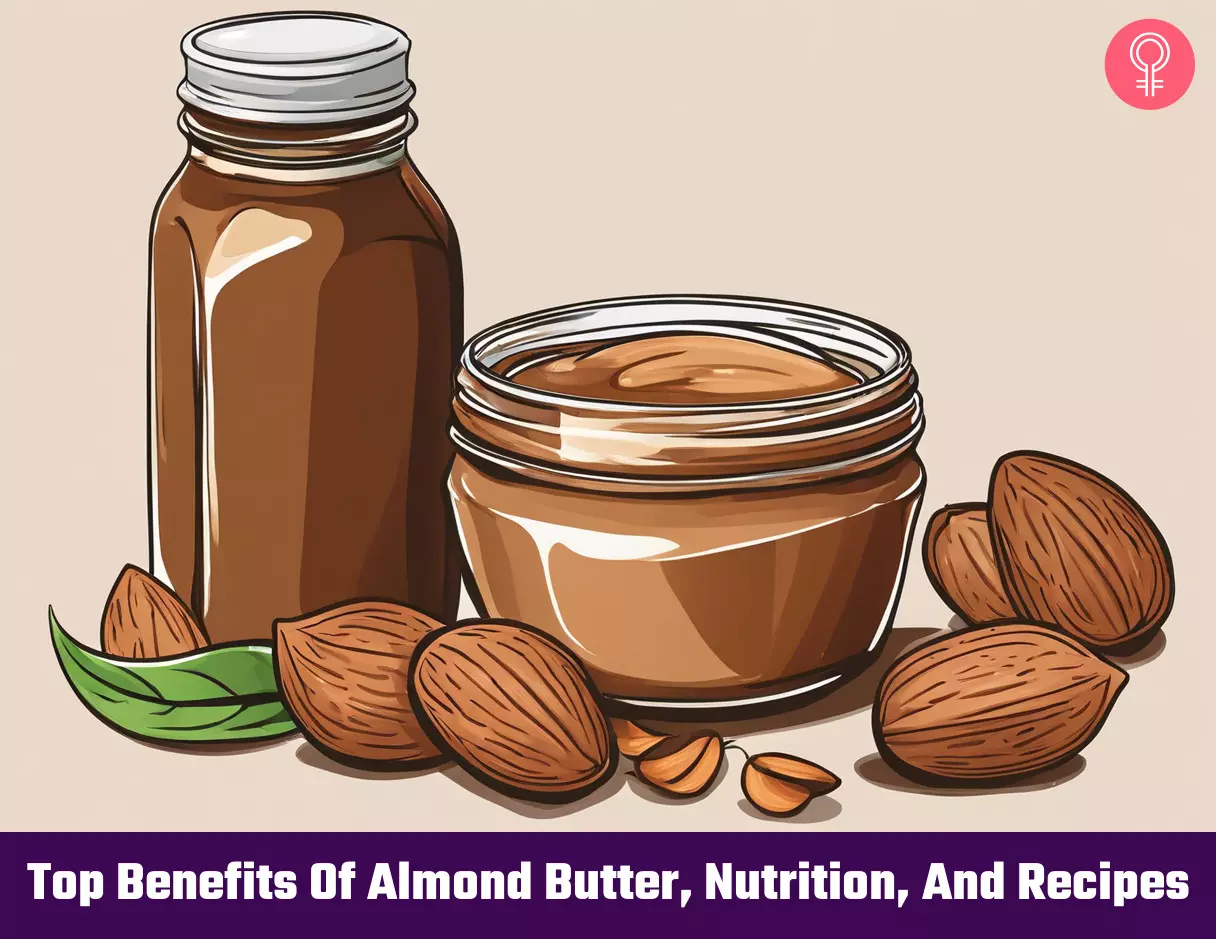
Image: Stable Diffusion/StyleCraze Design Team
Learn more about the benefits of almond butter for fat loss and muscle gain in this enlightening video. Discover how this nutritious spread can enhance your fitness journey.
Personal Experience: Source
StyleCraze's articles are interwoven with authentic personal narratives that provide depth and resonance to our content. Below are the sources of the personal accounts referenced in this article.
i. How to use almond butterhttps://www.youtube.com/watch?v=S8Z6_mO_fd0
References
Articles on StyleCraze are backed by verified information from peer-reviewed and academic research papers, reputed organizations, research institutions, and medical associations to ensure accuracy and relevance. Read our editorial policy to learn more.
- Almond butter
https://fdc.nal.usda.gov/fdc-app.html#/food-details/1100555/nutrients - Nut Consumption and Risk of Cardiovascular Disease
https://www.ncbi.nlm.nih.gov/pmc/articles/PMC5762129/ - Vitamin E and cardiovascular disease
https://pubmed.ncbi.nlm.nih.gov/19451807/ - Long-term almond supplementation without advice on food replacement induces favourable nutrient modifications to the habitual diets of free-living individuals
https://www.ncbi.nlm.nih.gov/pubmed/15469659/ - Omega-3 Fatty Acids
https://ods.od.nih.gov/factsheets/Omega3FattyAcids-Consumer/ - Repeated administration of almonds increases brain acetylcholine levels and enhances memory function in healthy rats while attenuates memory deficits in animal model of amnesia
https://pubmed.ncbi.nlm.nih.gov/26548495/ - Effects of daily almond consumption for six months on cognitive measures in healthy middle-aged to older adults: a randomized control trial
https://doi.org/10.1080/1028415X.2025.1868805 - Pregnancy and Nutrition
https://medlineplus.gov/pregnancyandnutrition.html - Diet quality improves for parents and children when almonds are incorporated into their daily diet: a randomized, crossover study
https://pubmed.ncbi.nlm.nih.gov/26773784/ - Magnesium and Osteoporosis: Current State of Knowledge and Future Research Directions
https://www.ncbi.nlm.nih.gov/pmc/articles/PMC3775240/ - Magnesium and type 2 diabetes
https://www.ncbi.nlm.nih.gov/pmc/articles/PMC4549665/ - Omega-3 Versus Omega-6 Polyunsaturated Fatty Acids in the Prevention and Treatment of Inflammatory Skin Diseases
https://www.ncbi.nlm.nih.gov/pmc/articles/PMC7037798/ - The protective effect of peanut walnut and almond consumption on the development of breast cancer
https://pubmed.ncbi.nlm.nih.gov/26183374/ - The relationship between nut intake and risk of colorectal cancer: a case control study
https://www.ncbi.nlm.nih.gov/pmc/articles/PMC5840774/ - Dietary oxalate and kidney stone formation
https://www.ncbi.nlm.nih.gov/pmc/articles/PMC6459305/ - Peanut butter creamy
https://fdc.nal.usda.gov/fdc-app.html#/food-details/2262072/nutrients - Nut Butters
https://www.sciencedirect.com/topics/agricultural-and-biological-sciences/nut-butters
Read full bio of Dr. Pallavi Srivastava
Read full bio of Sindhu Koganti
Read full bio of Ravi Teja Tadimalla
Read full bio of Aparna Mallampalli







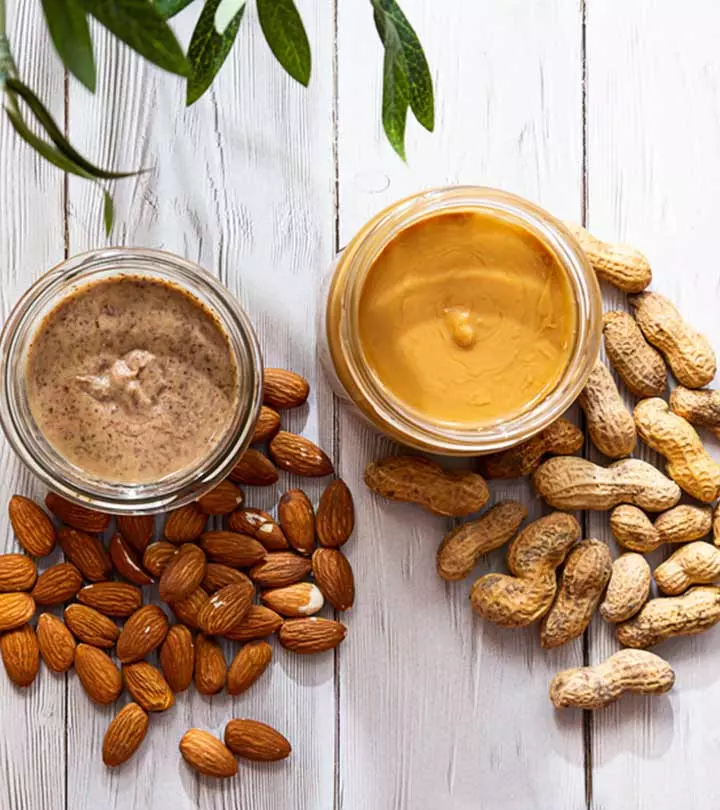
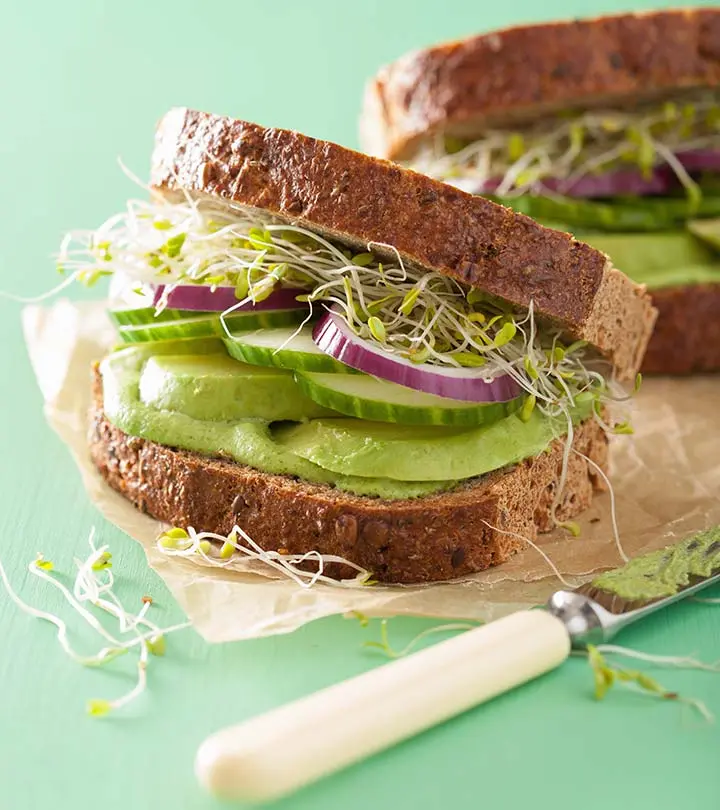


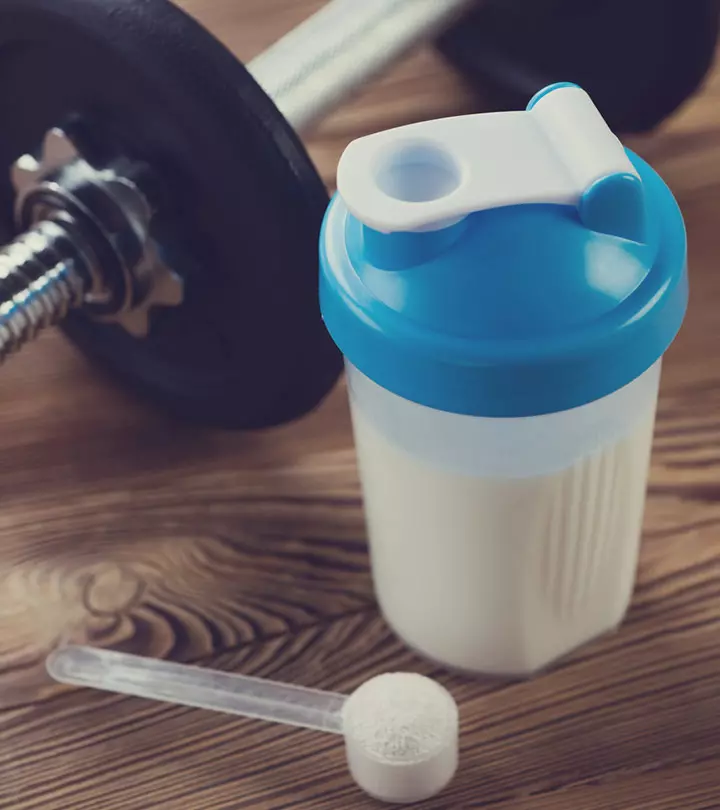



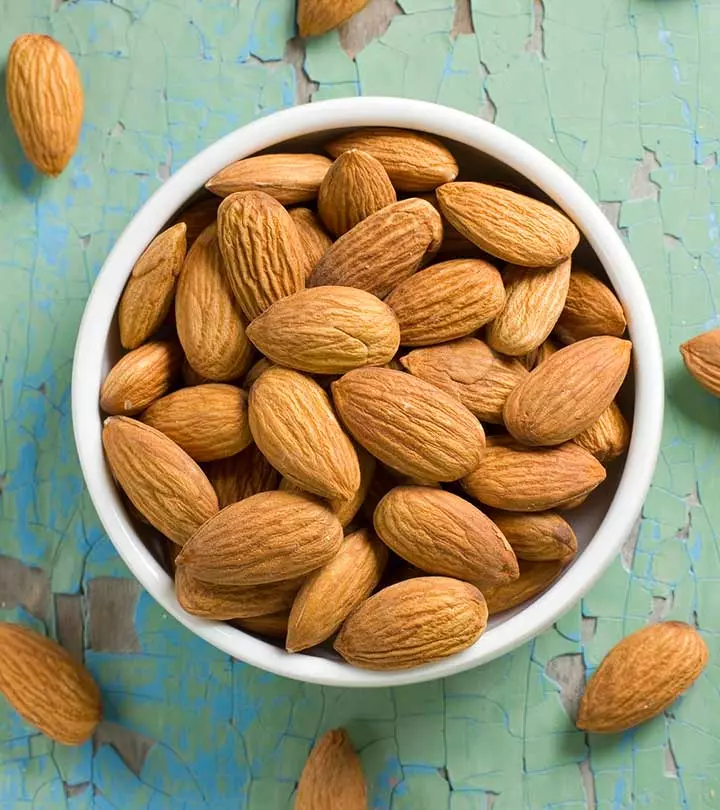
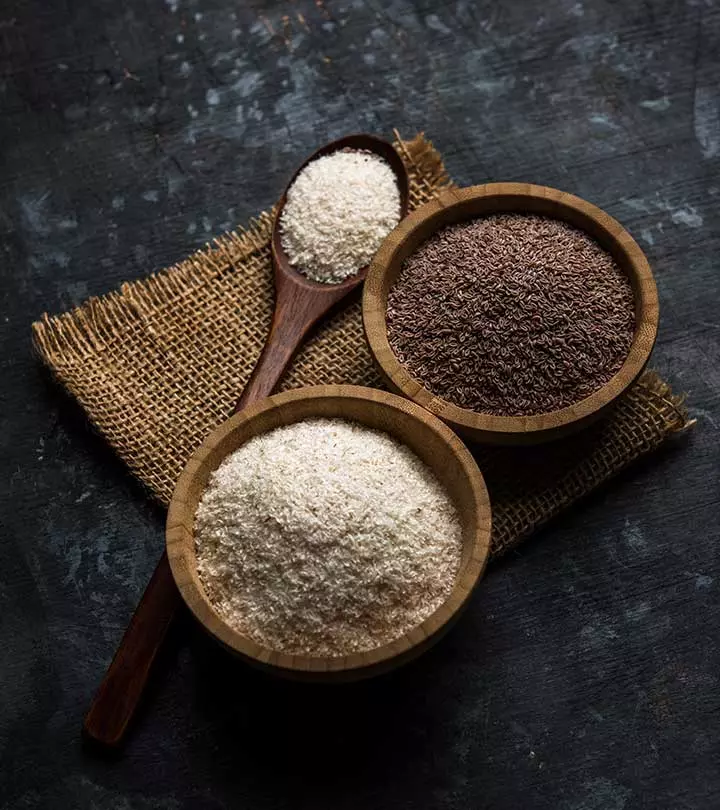



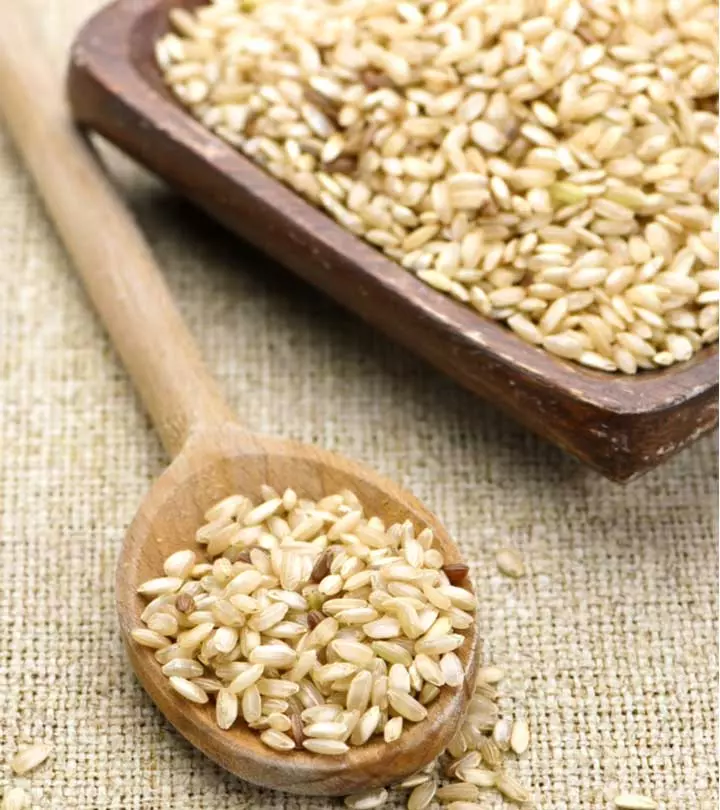
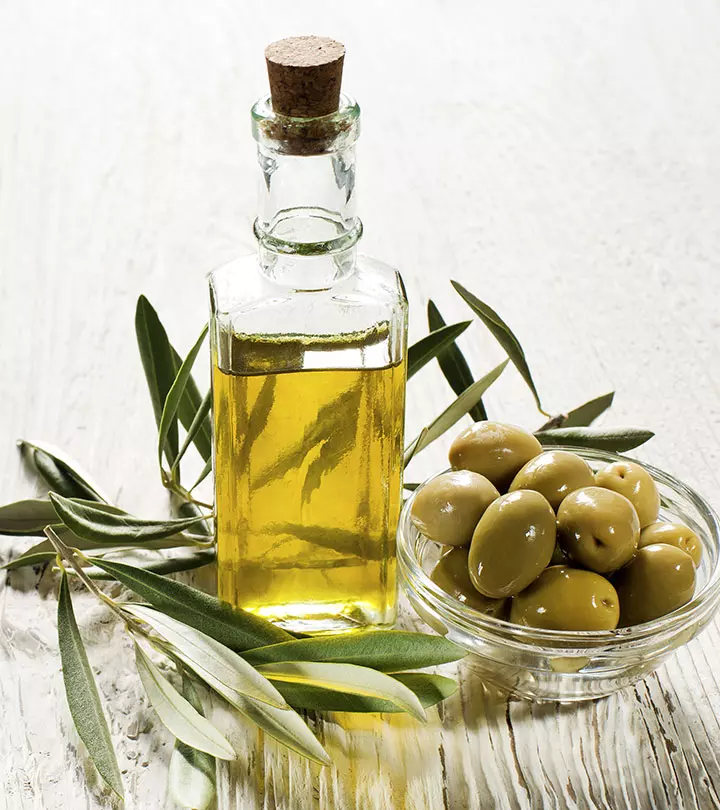

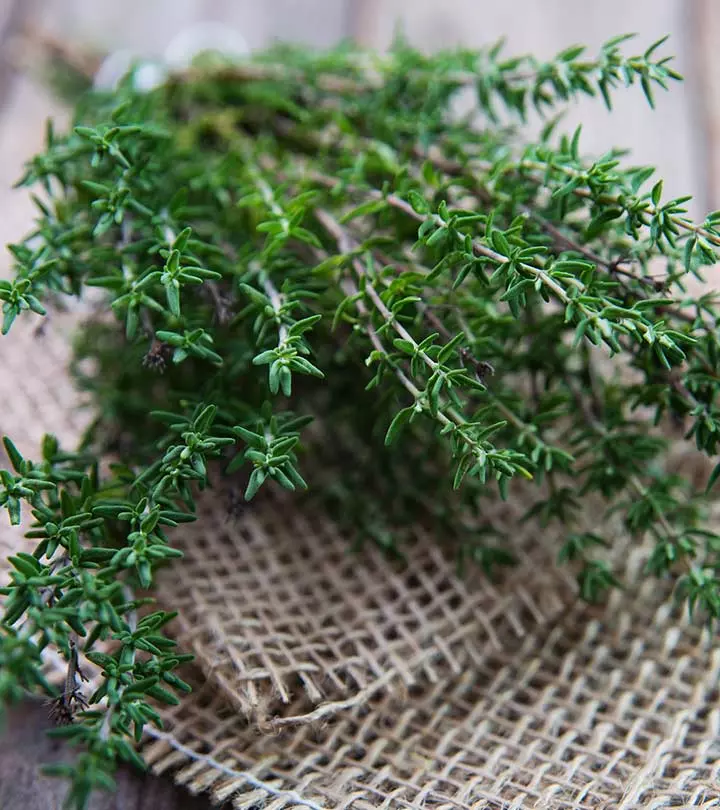




Community Experiences
Join the conversation and become a part of our empowering community! Share your stories, experiences, and insights to connect with other beauty, lifestyle, and health enthusiasts.